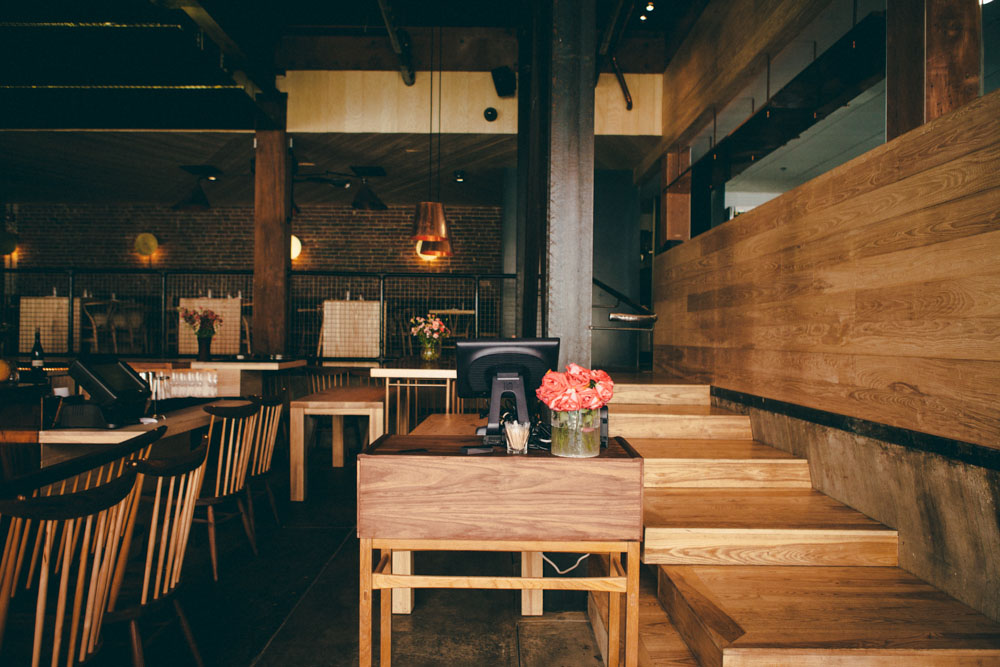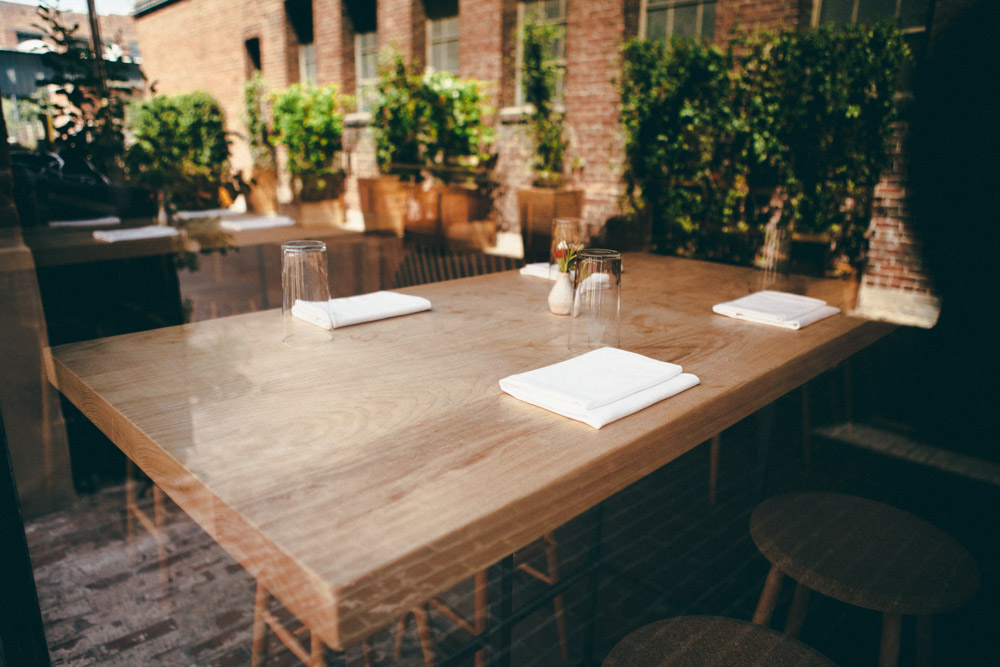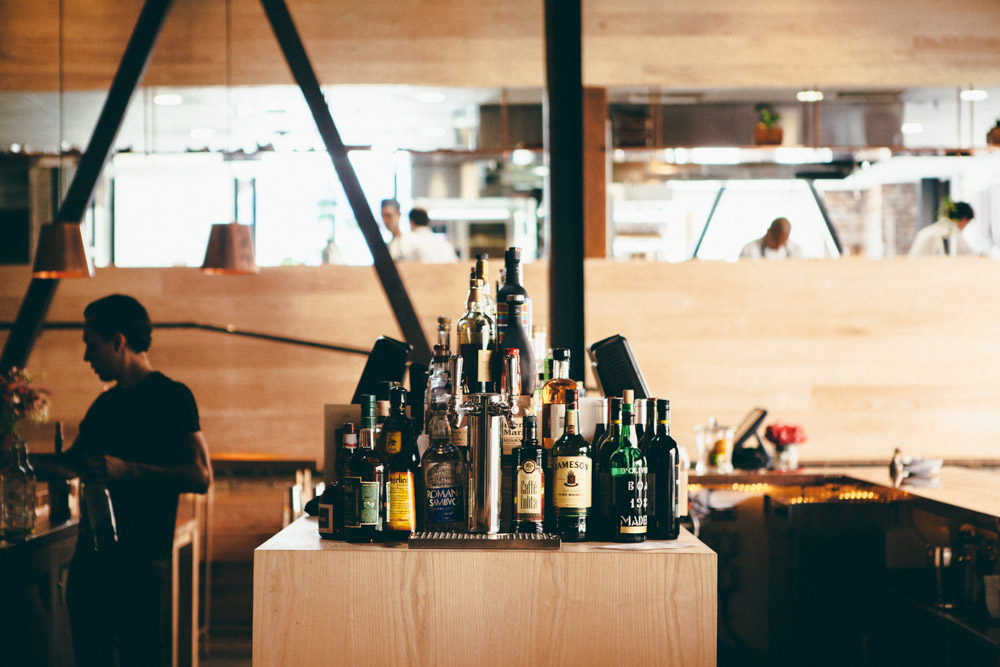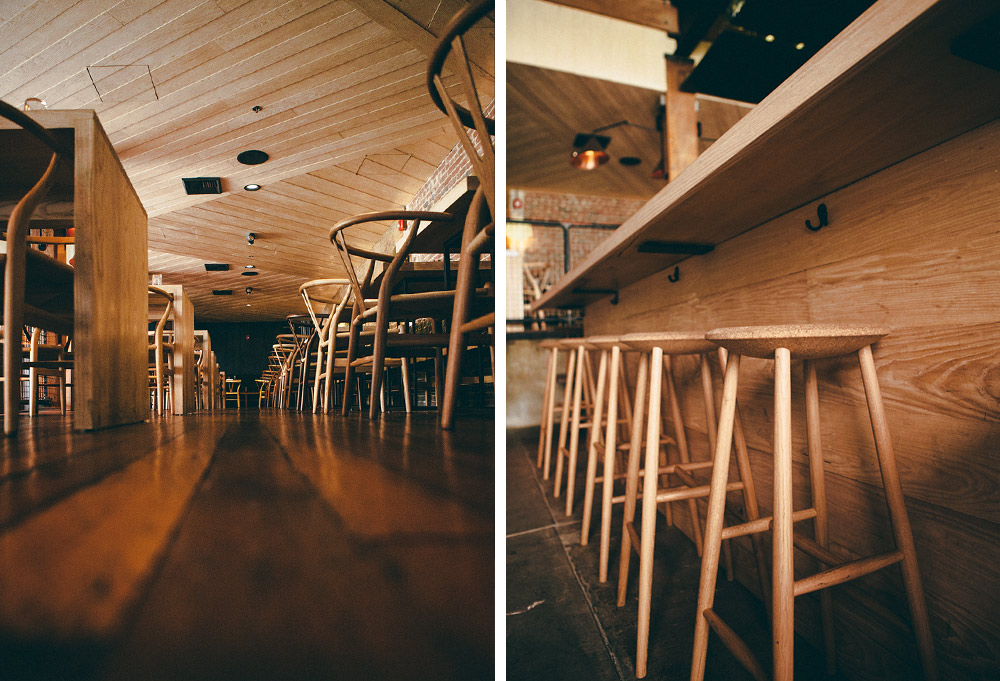Once upon a time, Los Angeles was known merely for Hollywood’s glitz and glamour, and placed little emphasis on food culture. Not anymore. In a span of no more than three years, LA has become one of the country’s hottest destinations for restaurants, chefs, and lovers of food (I dare not say foodie). However, even amidst this emerging food scene and its world-class chefs, Fifty Seven stands out with an exciting and distinct concept that reaffirms LA as an experimental and exciting culinary destination.
Similar to a residency, there is a rotating roster of chefs that pass through the kitchen doors of Fifty Seven in order to showcase each chef’s menu, passion, personality, and choice of cuisine. Each of the rotating chefs remain at the restaurant for a “season,” which can be anywhere between three and six months, ensuring that guests are exposed to new talent throughout the year. With every new chef, the kitchen staff (structured like a brigade) and the service staff (trained with an extreme focus in hospitality) stay the same in order to adapt and uphold the restaurant’s mission and philosophy. Upon learning this I was highly intrigued, and I set out to learn more about the inner workings of such a concept and the structure of building a strong, foundational staff—both back and front of house—to support the inevitable transition of the chef.
It’s one o’clock on a Wednesday afternoon, Chef David Nayfeld, and his kitchen brigade have begun to chop, dice, boil, and braise in preparation for the evening’s carte du jour. Normally, I would be immersed in the chaos of the kitchen, observing the cooks, and listening to the Chef’s journey, but I’ll leave that particular story for another time (Fifty Seven, Part Two: David Nayfeld). Today, I’m here to see General Manager Lauren Smith & Manager Sarah Kim—the ladies that lead and manage the service staff and front of house.


Where did you grow up?
Lauren: I’m originally from Indiana—I’m a Midwestern girl. I always tell people that farm-to-table has become this thing in Los Angeles, but that’s just how we eat. We just go down the street and grab food. I always grew up with my family cooking. When I got my first job at 15, it was at a restaurant. And I’ve just been doing it ever since.
At this point, I’ve been doing this for so long it has seeped into every other aspect of my life. Every vacation I go on, I try the food in that city; like wine tasting in California, for example. The nights I have off I go to a new restaurant. It becomes so much of who you are, you become consumed by it.
Sarah: I’m originally from Las Vegas—I grew up there. I didn’t originally start off in this industry. I started working when I was 15 and the first job I really got was in retail and I landed at Armani and went through the high-end kind of thing. It was fun for me for a couple years, but it got kind of crazy and didn’t really make sense to me to spend so much money on these tangible things that you can throw away.
America.
Sarah: I ended up working for Tao for a while. When they opened, I worked the nightclub side, and I was in the marketing department for a while. I moved on to open Tao Beach, and I got sick of selling bottles to people who would spend $10,000 on a night where it’s going to literally go down the toilet. So it dawned on me that I needed something else.
I’ve always been a fan of food. I’ve always been a fan of dining. My parents are Korean. In this culture, it’s all about the dining experience: sitting at the dining table with your entire family and you have to sit at a certain time with every single member of the family. Every day, you figure out what kind of problems you have, you figure out your life. It was a culture, and it was the standard for me. It really drew me to the restaurant side. My mother, fortunately, spoiled us growing up by taking us to different restaurants and making us try different kinds of food. So I’ve always loved it and it made a lot of sense. Once I got into it, we meshed, and I’ve been so much happier as a person.

Food is the one thing we all have in common.
Sarah: It’s something I find absolutely amazing. It’s the language of the world. It crosses all borders. Food, wine, drinking, being around family, sitting around a dinner table—or any table, for that matter—cooking: that’s the true essence of life. It’s something that brings so much joy to so many people.
How would you describe Fifty Seven?
Lauren: The thing is, there are so many components in this project—that’s the biggest thing we had to overcome. I think the number one thing we want to see embodied is community—that warm feeling you get when you go somewhere and you see a chef from another restaurant dining. You can see the guys from Stumptown Coffee down the street when they get off work and they come to the bar. There’s an artist who lives a few blocks away and they’re performing downstairs. There’s that sense of being a part of California and being a part of the Arts District.


Our wood is reclaimed from buildings in the area. We use California winemakers and local craftsmen. We have produce from local farmers in the area. Everything has a story, and everything is very tied in to go with it. I think it’s how we’re able to have one voice even though we have so many different things going on.
We all wanted to be a part of this project. We were all doing other things and were happy where we were in life, but we all wanted to be here. We have a very similar idea of what we want the energy of the place to be and what we want the staff to be like.
I think community is honestly at its core. You can’t really do well in this business if you don’t have that. Those are the people who make it worth it and will support you and embrace you, and you embrace them. They’ll open their art studio down the street and will have their big dinner here. And on my day off I might go visit. It’s all related.
Food, wine, drinking, being around family, sitting around a dinner table—or any table, for that matter—cooking: that’s the true essence of life.
Sarah: Everything combined together catapulted me into Fifty Seven and what this place embodies. You have the food aspect of it, of course—the rotating chefs and the whole concept of it. It’s a food-driven place and the food is absolutely spectacular and takes center stage. But apart from that, you have the cocktail program that has really taken three months to develop 12 cocktails that are incredibly precise in measurements when it comes to its recipes.
We have a wine list where we sat through multiple tastings and probably tasted over 2,000 wines…
Lauren: Each.
Sarah: We were tasting through that and really curating together and making sure it was everything she loved and I loved and our chef loved and it complemented the food. And the same with the service and culture aspect of it, we hired everybody based on their personality rather than what they had on paper.


How would you define hospitality? Many restaurants miss the mark on what hospitality truly means.
Sarah: As far as L.A., hospitality at Fifty Seven is like inviting people into our home. We’re proud of it; we love it. We want people to walk in here, feel the warmth and comfort, eat some good food and have some good drinks. That’s really all it boils down to. It’s about giving people what they want and giving people something they’ll appreciate and find happiness in. They’ll want to come back for more because they remember the experience, not necessarily the dish or one drink. It’s remembering the experience of a feeling they had when they got here and when they left.
Lauren: The hiring is a big part of it. Like I said with the community aspect, you can’t fake hospitality. And everyone we brought on is a service professional. Either it’s a career for them or they love the industry. We were really careful to not be a second choice. We didn’t want anyone who felt they had to be here. Everyone was like, “I love food, I love wine, love cocktails, I love service, I love community and I want to move my way up in this industry. I want to be a part of a restaurant like this.”
You’re being taken care of by somebody who really does respect the integrity of it, and they respect hospitality in general rather than just moving through the motions. And they want to get better at it; they want to excel. This is a career for them. They actually want to be here doing this. Usually we have to tell them they can’t work anymore. They’ll ask, “Well, can I come and take a wine class on my day off?”
It’s about giving people what they want and giving people something they’ll appreciate and find happiness in.

How do you build a sustainable foundation for the staff? For a concept like Fifty Seven, the chef is going to eventually leave and a new chef will come in but the staff needs to remain. How do you work out that transition?
Sarah: We have manuals upon manuals for everything. We have Beer 101, Spirits 101—talking about each spirit, how it’s distilled and fermented. If there’s a second distillation, what are the different types? We have How to Serve Wine, How Is Wine Made?, What are the different types of wine?, What Is Service? We really wrote everything down as a step-by-step procedure, what we expect, and what we want in this restaurant. But it doesn’t become robotic when they come out onto the floor—that’s when their personalities can shine.
It’s the same kind of basis as the rotation of the chefs. Having that as a backbone and having it instilled in our staff allows us to sit there and be like, “Here’s a new menu. We’ve got to memorize all of this. Let’s dissect every single thing. Let’s figure out what it looks like and how we can pair it with this wine.” It lets us play with and refine that aspect of it.
What does the structure of the staff look like?
Lauren: Structure is the key word for making this whole rotating program work. It’s the same in the dining room: you have your management team—there are four of us—so Sarah and I oversee it all and have all of our administrative duties—all the fun stuff. Then we have Max, our sommelier, who has completely taken over wine and service—he does a fantastic job. He does a lot of training; he’s really hands-on with the floor. We have our floor manager, Benny: he’s really big on staff morale, new employees and the ins and outs of day-to-day service.
As far as our server structure goes, we have captains. Those are the people who are setting the pace of your meal, interacting with you the most and leading your experience.
The other person you’ve seen coming over is their assistant server. They are the captain’s right-hand man or woman and help to facilitate whatever experience the captain was giving. They help guide the table. They help with table maintenance, making sure glasses are filled and everything is always cleared.
Then we have our kitchen servers who are the liaison between the kitchen and the dining room. They help run the food out from the kitchen. It’s not just bringing the food out, but dropping it in a beautiful dance-like way. It’s perfectly explaining each dish. They have to have a lot of menu knowledge as a kitchen server. They have to know how everything is prepared—every ingredient in every sauce. It’s not always things people have heard of. The knowledge we expect from them for Chef David’s style of cooking, his technique, and all the wild and crazy things we bring in from all across the state; they are constantly with our expo learning all that.
We have the expo, who is between the chef and the rest of the kitchen and servers. You have your bar with your lead bartender, who is responsible for their cost and training and making cocktails. Just like the kitchen, there are a lot of different positions. We have someone who helps oversee downstairs, and underneath that is support. And we’re here to support them and the kitchen. We’re all holding each other up and helping each other—and holding each other accountable too.

Sarah: The whole thing with our training as well, even when we were hiring after we had opened—to now and going forward—everyone starts as a host or kitchen server. During our training, everybody learned everything whether they were a host or captain or bar-back. Everyone learned everything at the same time—how to serve wine, everything about every wine we have, our by-the-glass list and our by-the-bottle list.
The two new people we hired last week are going through the two-week training of working, going through every position and shadowing. They’ll start as a kitchen server and will eventually move up to an assistant server—or wherever they may fall. If they work at the bar, they’ll start as a bar-back and they’ll move up to a bartender. It creates a culture of learning and taking ownership of the information we give them and mastering each level until they get where they want to be.
Lauren: It’s almost like a school. Everyone is going to hospitality school, basically—even the chefs. For those in the kitchen, they have to learn all the different techniques for chefs who come in and have completely different styles and completely different ingredients—it’s the same for the dining room.


What are some of the struggles or challenges that you face on this side of the kitchen?
Lauren: I’ve dealt with so many different types of people in different types of situations. You learn how to deal with it; you learn how to not let it faze you. In this industry, you’re a people pleaser. Most of the time it works out because most of the time you are already pleasing people. It’s great and that’s why you love what you do. You’re giving them this experience and they’re happy and you’re happy and it’s great.
I think when you first start out in your career, people inevitably won’t be happy and you’ll take it very personally. You’ll think, “This person is so upset. I don’t understand.” It seemed to be over something you felt was so small, and you tried so hard to please them. What you have to remember—which is what we tell the staff and what we protect them from—is that you don’t know what happened before they got here. You don’t know if someone in the family passed away, if they had an argument with their husband, or if they had something bad happen at their job.
You have to remind yourself that these people are coming here to escape and have a positive experience. Maybe what they were escaping is a good thing or a bad thing, but the heat is always going to be there. It doesn’t matter. As good as you get, as amazing of a place you are, it will be impossible to please every single person. I’m really trying to perfect that, but it’s not going to happen every time.
What does the staff look for when observing their guests?
Lauren: I mean, what are they not looking for?
Sarah: Your glass can be half empty with water, so they need to pour water. There might be somebody looking around and not engaging in conversation where they’re looking for a server to order another drink or find where the bathroom is.
You’ve got to take cues on everything: the way the table looks and the way people look, how they’re reacting to the service and the food and drinks. Is somebody eating a dish and do they have a face of unhappiness? How can you fix it? You must be able to be proactive about it. They’re looking for social cues; they’re looking for body language—every little thing we can to make this experience great.


It’s like a psychological game.
Lauren: You really learn a lot when you work in this industry because you’re around so many different personalities, backgrounds, and ages on a daily basis. You start to learn that certain types of diners don’t want to be bothered. If they’re in a business meeting don’t ask a bunch of questions; make sure you’re a ghost. You could interrupt their train of thought.
Or you could have a couple that’s on their first date. It might be a little awkward and they don’t know how to have conversation. Maybe you’ll want to engage a lot with them. They can get the jitters out and they can talk to you and they don’t have to feel uncomfortable talking to each other. They might not be secure yet.
Maybe get them a little more alcohol…






—
Fifty Seven
712 South Santa Fe Avenue
Los Angeles, CA 90021
Further Reading:
Fifty Seven, Part 2: David Nayfeld







Our comments section is for members only.
Join today to gain exclusive access.